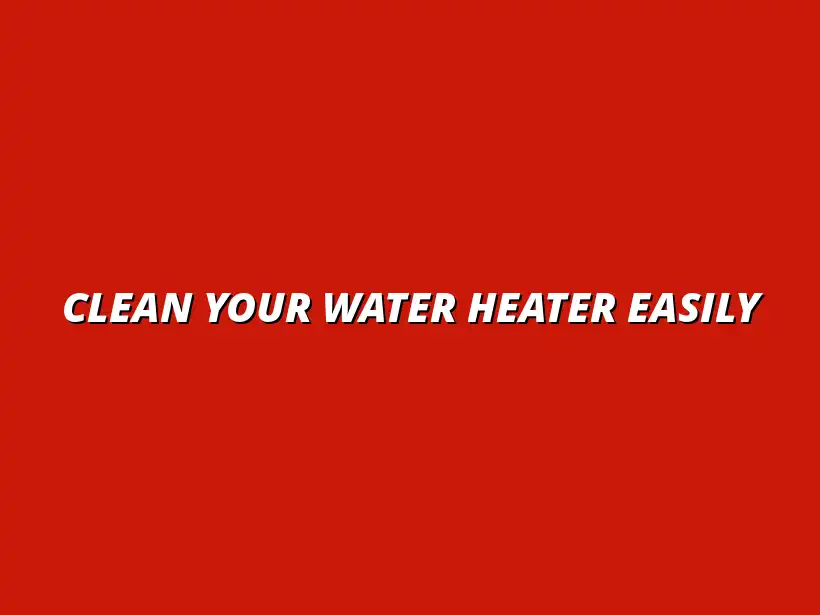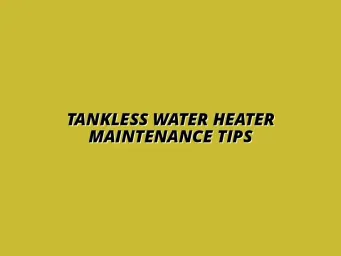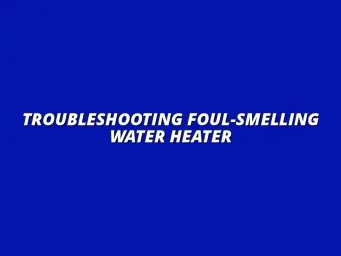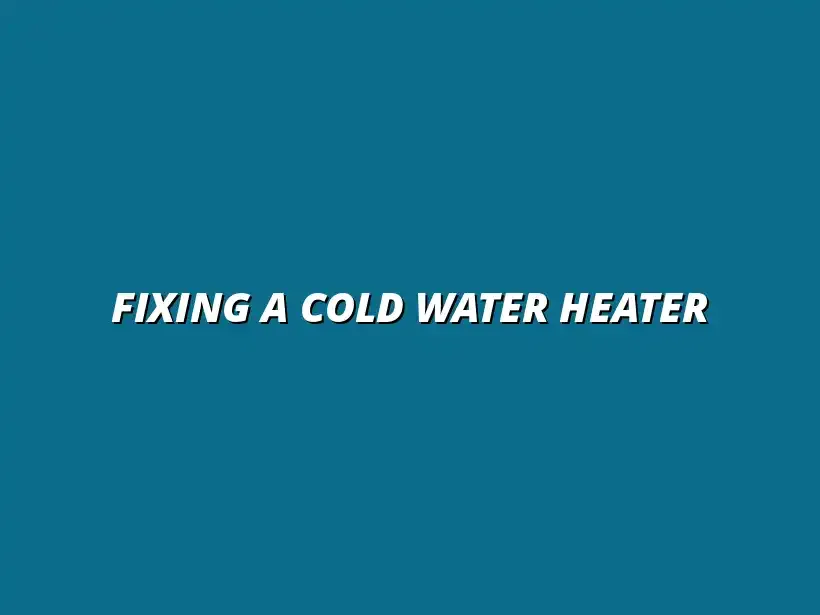
Clean Your Water Heater Easily
Understanding the Importance of Water Heater Maintenance for Optimal Heating Efficiency
Water heaters play a crucial role in our daily lives, providing hot water for showers, cleaning, and cooking. Without proper functioning, chores can become tedious and uncomfortable. This is why understanding the importance of water heater maintenance is essential for ensuring optimal heating efficiency.
Regular maintenance not only enhances the performance of your water heater but also extends its lifespan. A well-maintained water heater can save you money on energy bills and help prevent unexpected breakdowns. Thus, investing a little time in maintenance goes a long way in keeping your home comfortable! To learn more about extending your water heater's lifespan, check out this helpful guide: extend your water heaters lifespan.
The Role of a Water Heater in Household Comfort
Water heaters are more than just appliances; they are a vital part of our home comfort. They provide hot water for various household activities, such as taking a relaxing shower, washing dishes, and doing laundry. When your water heater works efficiently, it contributes significantly to your overall quality of life.
In addition to comfort, having a reliable water heater is also linked to hygiene. Hot water is essential for effectively cleaning surfaces and sanitizing dishes. Therefore, keeping your water heater in good shape ensures that your home remains a safe and pleasant environment. Maintaining your water heater efficiently is key to its longevity and your comfort; find out how here: maintain your water heater efficiently.
- Daily tasks like showering and washing become easier with hot water.
- Proper water heater function helps maintain household hygiene.
- Comfort in daily routines can increase overall satisfaction at home.
Consequences of Neglecting Water Heater Maintenance
Neglecting water heater maintenance can lead to a host of problems. Over time, sediment can build up in the tank, reducing heating efficiency and increasing energy costs. If left unchecked, this can escalate into more severe issues, such as leaks or complete appliance failure.
Additionally, a poorly maintained water heater can pose safety risks. For instance, pressure build-up may cause the tank to burst. Regular maintenance helps mitigate these risks, ensuring your water heater operates safely and effectively. Understanding the causes and fixes for water heater leaks is crucial; learn more here: water heater leak causes and fixes.
- Increased energy bills due to decreased efficiency.
- Risk of leaks or malfunctions leading to costly repairs.
- Potential safety hazards that may endanger your home.
Essential Tools and Preparations for Cleaning a Water Heater
Cleaning a water heater is an important task that requires some basic tools and preparations. Being well-equipped ensures that the cleaning process goes smoothly and efficiently. Let's dive into what you'll need to gather before you start!
Having the right tools not only makes the job easier but also helps to prevent any accidents during the cleaning process. Here’s a breakdown of what you’ll need:
List of Tools Needed for Water Heater Cleaning
Before diving into the cleaning, it’s essential to collect all necessary tools. Here’s a quick list of items you’ll need:
- A garden hose to drain the tank.
- A bucket to catch any spills.
- A screwdriver to remove any panels.
- A brush or vacuum for sediment removal.
- Protective gloves for safety.
Common Household Items to Use
Some cleaning tasks can be accomplished using items you might already have at home. Here are a few examples:
- Baking soda to help clean and deodorize.
- Vinegar for a natural cleaning solution.
- A sponge or cloth for wiping down surfaces.
Specialized Cleaning Supplies for Water Heaters
While common household items are useful, some specialized supplies can enhance the cleaning process. Here are a few recommended products:
- Water heater cleaning solution (available at most hardware stores).
- Descaling agents to remove mineral deposits.
- Rust remover for any corroded metal parts.
Safety Precautions Before Starting the Cleaning Process
Safety should always come first when cleaning your water heater. Before you start, make sure you take the necessary precautions to protect yourself and your home. Following proper guidelines can prevent accidents and ensure a safer cleaning experience!
In addition to having the right tools, being aware of safety measures is crucial. Here are some key precautions to keep in mind:
Guidelines for Avoiding Electrical Hazards
Water heaters often operate on electricity or gas, which can pose hazards if not handled properly. Make sure to:
- Turn off the power supply at the breaker box.
- Ensure the area around the heater is dry before starting.
- Use insulated tools to reduce electrical risks.
Handling Hot Water and Pressure Relief Safely
Hot water can cause burns, and pressure can lead to hazardous situations. It's essential to follow these guidelines:
- Wear heat-resistant gloves when handling hot components.
- Be cautious when opening valves to release pressure.
- Always allow the water to cool before draining the tank.
Addressing Common Questions About Water Heater Cleaning
Understanding your water heater and its maintenance needs can feel overwhelming at times. However, addressing common questions can help simplify the process and ensure your water heater remains in top shape. Let’s dive into some of the frequently asked questions about water heater cleaning!
How Often Should I Clean My Water Heater?
Cleaning your water heater is an essential part of maintaining its efficiency. Generally, it’s advisable to clean your water heater at least once a year. This annual cleaning helps remove sediment build-up, which can compromise heating efficiency and increase energy costs. For more tips on annual water heater inspections, see this helpful resource: annual water heater inspection tips.
- For areas with hard water, consider cleaning every six months.
- If you notice a decrease in water temperature, it may be time for a cleaning.
- Schedule cleaning ahead of peak usage seasons, like winter.
By staying on top of your cleaning schedule, you can extend the life of your water heater and ensure it runs efficiently. Remember, a well-maintained water heater provides consistent hot water when you need it!
What Are the Signs of Sediment Build-up in My Water Heater?
Identifying sediment build-up early can save you from costly repairs down the road. Here are some common indicators that your water heater may be suffering from sediment accumulation:
- Unusual noises or banging sounds when the heater operates.
- Reduced hot water supply or fluctuating water temperature.
- Discolored or cloudy hot water.
- Water appearing metallic or having a rusty smell.
If you notice any of these signs, it’s essential to act quickly. Cleaning your water heater as soon as possible can help restore its efficiency and prevent further damage. Regular maintenance, including checking for these issues, is key to extending the life of your home's plumbing overall: extend your homes plumbing life.
Strategies for Enhancing Water Heater Efficiency Post-Cleaning
After cleaning your water heater, it’s time to implement some strategies to maximize its efficiency. These energy-saving tips can help you save money and ensure your water heater operates at peak performance.
Energy-Saving Tips for Water Heater Operation
Implementing energy-saving practices can significantly boost the efficiency of your water heater. Here are some straightforward tips:
- Adjust Temperature Settings: Set your water heater temperature to 120°F for optimal performance.
- Insulate Your Water Heater: Use insulation blankets to reduce heat loss.
- Time Your Hot Water Use: Use hot water during off-peak hours to save energy.
By following these tips, you can enjoy not only a well-functioning water heater but also lower utility bills! Small adjustments can lead to substantial savings over time. Regular bathroom plumbing checks can also help identify potential issues before they become major problems: essential bathroom plumbing checks.
Adjusting Temperature Settings for Optimal Performance
Adjusting your water heater’s temperature setting can be a game changer. The Department of Energy recommends keeping your water heater at 120°F. This temperature is hot enough for most household needs but low enough to prevent scalding.
Moreover, lowering the temperature can reduce energy consumption, leading to lower bills. Remember to check the settings periodically to ensure they remain consistent with your needs!
Insulating Your Water Heater for Improved Efficiency
Insulating your water heater can significantly enhance its efficiency. By wrapping insulation around the tank, you reduce heat loss, allowing the heater to use less energy to maintain the desired temperature.
This simple step helps your water heater work less, saving energy and extending its lifespan. Make sure to follow the manufacturer's instructions for proper insulation techniques!
Long-Term Care for Your Water Heater
Long-term care is crucial for maintaining your water heater's performance. Regular checks and maintenance ensure your unit remains in excellent working condition. Here are some steps to consider:
- Conduct routine inspections to spot any leaks or signs of wear.
- Monitor and replace the anode rod as needed.
- Follow the manufacturer's guidelines for maintenance and cleaning schedules.
Staying proactive with your water heater care not only helps prevent problems but also enhances its efficiency. It's a win-win! For prompt and efficient plumbing services in Brandwood End, Birmingham, contact us: plumber in brandwood end birmingham.
Routine Checks to Prevent Future Issues
Incorporating routine checks into your maintenance schedule can save you time and money. Regularly inspect for any leaks, corrosion, or unusual noises. Addressing these issues early can prevent bigger problems from developing.
Additionally, checking the temperature settings and flushing the tank periodically can keep your water heater running smoothly. Remember, a little attention goes a long way!
Importance of Keeping Up with Manufacturer Recommendations
Every water heater comes with a set of manufacturer recommendations designed to enhance its lifespan and efficiency. Following these guidelines ensures you’re caring for your unit as intended.
These recommendations may include specific cleaning schedules, replacement parts, and maintenance tips. Staying informed about your model's needs will help you keep your water heater in top condition for years to come!
Final Thoughts on Maintaining Heating Efficiency in Water Heaters
In conclusion, regular maintenance of your water heater can significantly extend its lifespan. By addressing common maintenance tasks, you ensure a steady supply of hot water and improve energy efficiency.
Emphasizing the Impact of Regular Maintenance on Lifespan
Regular maintenance is key to preventing issues and extending the life of your water heater. Just like any appliance, taking care of it yields better performance and longevity.
Ignoring maintenance can lead to costly repairs and replacements down the line. Investing a little time and effort now can save you a lot in the future!
Encouraging Action Towards Water Heater Care
Let’s take action! Regularly cleaning and maintaining your water heater is an investment in your home’s comfort and efficiency. Establish a routine and stick to it, so you can enjoy hot water whenever you need it!
Whether you decide to tackle maintenance yourself or hire a professional, remember that a well-cared-for water heater is crucial for household comfort and efficiency.




